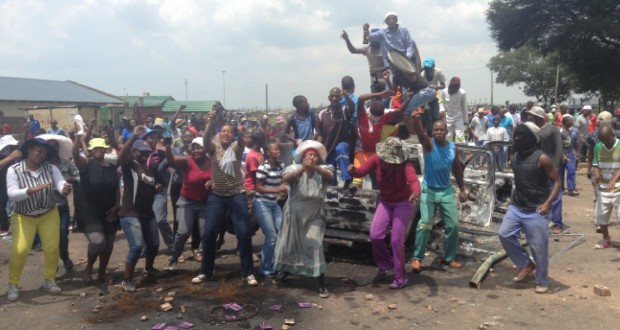The Emakhazeni local municipality in Mpumalanga is investigating an official who is accused of deliberately supplying dirty water to the community of Siyathuthuka township in Emakhazeni.
The municipality’s executive mayor Hamza Ngwenya confirmed with African Eye News Service (AENS) that an investigation was under way and that the official has since been moved from his position.
“There’s an employee who is suspected of channelling water directly from the dams bypassing the water purification process and feeding it directly to the community for consumption. This is a matter the municipality is still establishing the facts (about) with a view to deal with it administratively,” said Ngwenya on Wednesday.
On Monday, the entire township was brought to a standstill, when the community blocked all access roads to protest against dirty water and allegations of corruption by an official in the municipality.
Residents claim that the upheaval was sparked off by the flow of dirty black water from taps for more than a week.
“For more than seven days we were forced to buy water for drinking and bathing because the tap water was so dirty and black,” said a protesting resident who spoke on condition of anonymity.
Another resident told AENS that a local hospital advised him to boil water before consumption after his daughter fell sick, which could be an indication that the illness may have been caused by the water quality.
Provincial health department spokesperson Chris Nobela confirmed an increase in the number of patients with sicknesses that could be linked to the consumption of untreated water.
He said this, however, happened in December 2015.
“Between the 17th and 25th December (2015), the HA Grove Hospital in Emakhazeni treated 19 patients for stomach cramps and diarrhoea, and the patients were being advised to boil the water before use, and since then the situation has normalised,” said Nobela.
Ngwenya acknowledged that it was difficult for the municipality to deal with the matter.
He said as a precautionary measure, the municipality has shifted the official responsible for the water treatment plant to another department while investigations were still continuing.
“The issue of water quality cannot be resolved overnight, especially if it is true that there’s a person who is sabotaging (efforts to supply clean water). I’m told by the municipal manager that the suspect has been removed from the plant and placed in another department,” said Ngwenya.
He also disclosed that the water infrastructure in Emakhazeni local municipality was no longer capable to match the township’s rapid growth.
“Our infrastructure is no longer able to keep up with the population growth, while there has never been the upgrading of the infrastructure,” said Ngwenya.
He said, however, the department of water affairs would be installing the requisite infrastructure.
“There’s a project that we are going to be implementing through the (national) department of water and sanitation to improve the water infrastructure. According to the department of (water and sanitation), the contractor would be on site by April,” said Ngwenya.
In terms of the department of water affairs’ Blue Drop water audits conducted in 2014, Emakhazeni is described as Mpumalanga province’s 8th worst performing water service authority of the province’s 18 municipalities.
Emakhazeni’s overall Blue Drop score is a mere 50%.
“The Municipality has not maintained a comprehensive water safety planning process since the previous water safety plan was developed in 2012. Corrective actions identified in the 2012 risk assessment are still outstanding and limited implementation of any recommendations provided in the 2013 process audits,” reads the report.
The only time Emakhazeni’s water quality received a Blue Drop certification was in 2011 when it achieved a score of 89%.
 Ziwaphi Relentless quest for the truth
Ziwaphi Relentless quest for the truth






